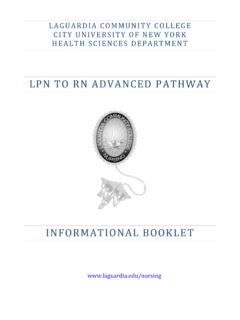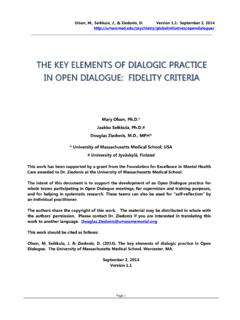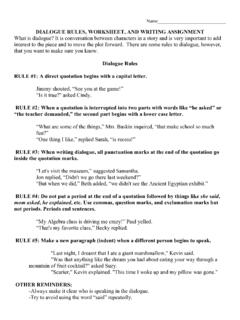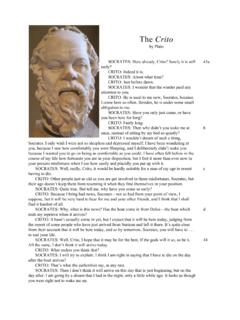Transcription of Unit 5 Understanding and Resolving Guest Problems
1 Project Hotel Curriculum Center for Immigrant Education and Training (ACE) LaGuardia Community College Unit 5: Understanding and Resolving Guest Problems Project Hotel Curriculum Center for Immigrant Education and Training (ACE) LaGuardia Community College 134 Hotel TEACH Lesson Plan Unit 5, Lesson 1 Career Counseling: Listening with Empathy Objectives Sts will learn to resolve Problems and listen empathetically for improved customer service. EFF Skill Sets addressed Cooperate with Others: Try to adjust one s actions to take into the account the needs of others and/or the task to be accomplished. Industry Skill Sets addressed Resolve Guest Problems Exceed Customer Expectations Activity 1: Empathy Skills T introduces another important component of active listening: empathy.
2 T asks the Sts to define empathy. As Sts call out answers, T leads responses towards the following definition and writes it on the board. Empathy is the ability to recognize and understand the emotions, beliefs, moods and desires of another person. Empathy is often characterized as the ability to put oneself into another s shoes. T elicits from Sts the reasons why it would be important for hotel workers to have empathy. Some examples might be as follows: 1. Listening empathetically makes people feel as if they are truly being heard and that their needs will be taken care of. 2. Listening with empathy gives guests a positive experience of the hotel and of you as a worker. Guests will always remember the worker who truly listened and cared about their problem, as opposed to the worker who offers a quick solution.
3 3. When you acknowledge how people are feeling, you reassure them that they are understood. I understand that you must be tired after your long flight. I ll get your room number right away. Or I would be upset also if the airline lost my luggage. 4. Empathy improves communication and strengthens relationships. 5. Empathy helps to establish trust. 6. Empathy and trust are essential to developing solutions, winning and retaining business, and avoiding or defusing conflict. Activity 2: Showing Empathy T breaks Sts into groups of three and has each group describe the behaviors of empathy. Write the following questions on the board to elicit answers from each group: (5 minutes) Project Hotel Curriculum Center for Immigrant Education and Training (ACE) LaGuardia Community College 135 How do you know someone understands your feelings?
4 What does he/she do? What does he/she say? When someone is upset, how do you know? What strategies have worked for you in dealing with an upset friend? What has not worked? Some examples might be as follows: Acknowledge the feelings of the other person. Keep eye contact. Give him/her your full attention. Put yourself in the person s shoes. Show concern. Use active listening; listen without interrupting. Offer to help resolve the situation. Don t minimize the situation or ignore the person s emotions. After Sts have brainstormed the answers, T asks each group to report and writes their suggestions on the board. T then hands out Steps to Listening with Empathy (Handout 1) to the class and has Sts volunteer to read it aloud. T answers any questions.
5 Activity 3: Empathy Practice This activity will give Sts an opportunity to practice showing empathy to guests. In the same groups of three, T has Sts choose among themselves who will play the role of a hotel Guest , who will be the hotel worker and who will be the group observer. T distributes Guest role-play cards (Handout 2) to the St playing the Guest so the St can study the role. T instructs the Sts who are playing the role of the worker that they should use the behaviors listed on the board to demonstrate empathy towards the Guest . T then hands out the rubric (Handout 3) to the Sts who are observing. The observers should be told to listen and observe the body language of the worker/ Guest role play and fill out the rubric for the group. After Sts complete the role play, T gives the observers 3 to 5 minutes to discuss what they observed with their group members.
6 T and Sts then discuss the activity as a group: T asks the Sts who played the Guest to explain what it felt like when someone was empathizing with them: Did your feelings about the situation change? How did it feel to have someone empathize with your feelings? What was your impression of the hotel after you had interacted with an empathetic employee? T then asks those who were playing the workers: Was it difficult to empathize? Why or why not? Project Hotel Curriculum Center for Immigrant Education and Training (ACE) LaGuardia Community College 136 If it wasn t easy to empathize, how were you able to do it? T then asks those who were observing the role play: Were there any behaviors that your group used that were not listed on the board or handout? Extension Activity Have Sts observe a co-worker who they believe demonstrates active listening skills and empathy in dealing with difficult guests.
7 Have the Sts analyze the way their co-worker deals with the situation using the rubric. Journal Exercise Instruct Sts to think about a difficult problem they have had as a customer or hotel Guest when they were not shown empathy. What would they change about the other person s response? How would empathy have helped? What other communication skills would have helped? Have Sts write these reflections in their journal. Teachers Tips Sts may be unfamiliar with some of the vocabulary in this lesson. Review words such as aggression and venting, and explain the difference between responding and reacting. When you respond, you take a moment to think about what you say before you say it. A response is centered and non-aggressive. Reacting is an emotional comeback to someone else s emotions.
8 Some workers may have felt offended and insulted by guests in the past. It may be difficult to empathize with someone who is upset. Explain that you cannot control other people s behavior, but you do have a choice as to whether you respond inappropriately or professionally. Project Hotel Curriculum Center for Immigrant Education and Training (ACE) LaGuardia Community College 137 Unit 5, Lesson 1: Handout 1 Role Play Cards Steps to Listening with Empathy When listening to an upset Guest : 1. Remain centered: Focus on your breathing, maintain eye contact and continue to listen to what is being said. When guests are upset, they are looking to resolve a problem. Allow them to vent. 2. Take ownership and offer your assistance: How does it feel to be in the Guest s shoes?
9 What needs does he/she have that are not being met? Example: I can understand why you are frustrated that your room is not ready. Please let me see what I can do to resolve the problem. 3. Ask probing questions: Continue to ask questions to understand what the Guest is trying to say and to reassure the Guest that he/she is being heard. Clarify the Guest s needs, and get more information to solve the problem: "Do you mean ..?" or "Did I understand you to say ..?" 4. Remain calm: Don't feel incompetent, angry or nervous if the Guest is overreacting. The Guest has a right to express his/her feelings. This is not a personal attack on you. Don't join the participant in an argument. Don t tell guests to calm down, as this often makes them angrier. Continue to listen and maintain eye contact.
10 5. Summarize and apologize: "You wanted the food cooked without butter." "You'd like extra towels in your room." Apologize to them and take ownership of the problem. Assure them that you understand that this has been a mistake on the part of the hotel. 6. What will resolve situation? Explain how you will take care of this. Do you need to refer them to another department? Communicate this in an assuring and genuine tone. 7. Do not take it personally: Do not carry any negative experiences home with you. Leave the situation in the past. Project Hotel Curriculum Center for Immigrant Education and Training (ACE) LaGuardia Community College 138 Unit 5, Lesson 1: Handout 2 Role-Play Cards After a very long and exhausting flight, you get into an argument with your partner because he/she forgot to buy travelers checks.

















